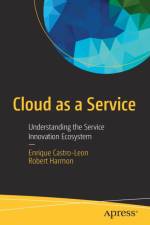- Understanding the Service Innovation Ecosystem
av Enrique Castro-Leon & Robert Harmon
695,-
See how the principles of Service Science govern the dynamics driving the adoption of cloud computing in the industry.Cloud as Service shows you how the evolution of enterprise computing platforms to application-specific cloud platforms (ASCPs) have aligned to business needs. You'll also learn processes for developing and building ASCPs. You'll gain insight into how executives, managers, and technologists are utilizing cloud services, cloud service providers, equipment manufacturers, and software and application vendors participating in cloud supply chains.For business, the appeal of cloud computing must go beyond the notion of convenient, on-demand access of networked pooled access to computing resources. Industry leaders have learned to apply cloud computing to become more nimble, cost effective, and customer engaging as they strive for competitive advantage, regardless of size. These companies define and build cloud platforms customized for their needs rather than using someone else's. This book shows you how to use a holistic, end-to-end view of platform planning, platform development, supply chains and operations to collapse platform development times to a fraction of the original time. You'll see that strategies for selling to the cloud market are essentially incomplete; and that in order to be successful, businesses must become cloud service businesses themselves, incorporating cloud technologies in their engineering, IT, sales and marketing, and delivery processes. What You'll Learn:Historical perspective to provide insight into the dynamics driving cloud evolution todayState of the art in IT requirements and cloud solutionsThe value of User Experience (UX) driven design principlesThe crucial roles of Service Brokers and Service Assurance ManagersThe landscape of emerging cloud services and what they mean to your enterpriseService Portals and Enterprise Service BusesWho This Book Is For:CIOs, CTOs, data center architects, solution architects and application engineers Educational institutions building a systems integration curriculum Developers who want to understand how their work fits in the cloud ecosystem

